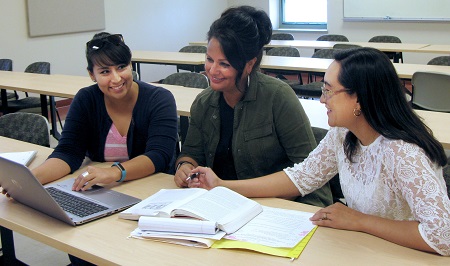 New Mexico State University Cooperative Extension Service county agents Marcella Talamante, Laura Bittner and Karim Martinez are doctoral students researching ways to help deliver Extension programs to the under-served populations of their counties. (NMSU photo by Jane Moorman)WRITER: Jane Moorman, 505-249-0527, jmoorman@nmsu.edu
New Mexico State University Cooperative Extension Service county agents Marcella Talamante, Laura Bittner and Karim Martinez are doctoral students researching ways to help deliver Extension programs to the under-served populations of their counties. (NMSU photo by Jane Moorman)WRITER: Jane Moorman, 505-249-0527, jmoorman@nmsu.edu
CONTACT: Karim Martinez , 575-525-6649, karmarti@nmsu.edu
CONTACT: Laura Bittner , 505-565-3002, lbittner@nmsu.edu
CONTACT: Marcella Talamante , 505-685-4523, marctala@nmsu.edu
Since the beginning of the land-grant university Cooperative Extension Service in 1914, rural, urban and suburban citizens have received research-based information to improve their lives. For example, Extension agents have helped farmers and ranchers achieve greater success, improved the health and wellness of families, and prepared youth to become future leaders.
New Mexico State University's College of Agricultural, Consumer and Environmental Sciences administers the state's Cooperative Extension Service in every county and continues to strive for excellence in serving its communities.
Society has changed since the early days of Extension to include a growing number of minorities and urban communities. Nationally, Extension is adapting to reach these new and often underserved audiences. New Mexico, as a multicultural state, provides many opportunities for NMSU's CES to reach diverse audiences.
Three CES agents, Karim Martinez, Laura Bittner and Marcella Talamante, see the importance of providing Extension information to diverse audiences and have embarked on an educational path of self-improvement to better equip themselves to meet the needs of today's changing society.
"My studies in the Educational Leadership and Administration Ph.D. program have definitely created greater awareness of the importance of reaching under-served populations, which is for whom Extension was originally established," said Bittner, program director of NMSU's Valencia County CES. "I am more mindful of challenges under-served populations may encounter accessing and participating in CES programming."
The College of Education graduate students recognize the importance of social justice, equity and cultural competence in their profession.
"This program has given me a new perspective on things I'm already doing," said Talamante, program director for Rio Arriba County CES. "Social justice means fairness to all members of your community. We have focused on equality when providing our programming, but now we need to think in terms of equity, to ensure that our programs are not only accessible, but that we communicate our offerings in ways necessary to reach everyone."
As the program director of Dona Ana County CES, Martinez works to deliver programs in culturally appropriate ways.
"Living in a border community and being bilingual has allowed me to bring Extension resources to audiences who may not have had access to this information in the past," Martinez said. "As Spanish-speaking populations increase nationally, some CES agents may find it challenging to reach this audience, especially if they have limited experience with Latino cultures, or are not bilingual."
Martinez is interviewing bilingual CES professionals nationally to learn from their experiences reaching Spanish-speaking audiences.
"I want to provide the Extension Service with strategies to improve outreach efforts to this audience, which can mean adapting programs in culturally appropriate ways," she said.
Bittner has learned that developing cultural competence is not just understanding societal traditions, but also recognizing that each individual has personal and family traditions, or ways of knowing and doing things.
"People living in the same neighborhood, of same ethnicity, religion, age, or economic group have different ways of doing things," Bittner said. "When providing educational programs, we must be aware these differences exist so we remain inclusive and communicate clearly and effectively."
Bittner's dissertation will specifically look at how Extension agents perceive their own cultural competence, barriers for developing cultural competence, and methods Extension agents use to reach and serve culturally diverse audiences.
"Cultural competence within CES is a growing topic across the United States," Bittner said of the concept being addressed in the education, health and medical fields. "Nationally, CES is working to improve cultural competency of Extension agents. New Mexico CES is well positioned to serve as the model for reaching a growing, ethnically and culturally diverse population because New Mexico has such rich cultural diversity."


